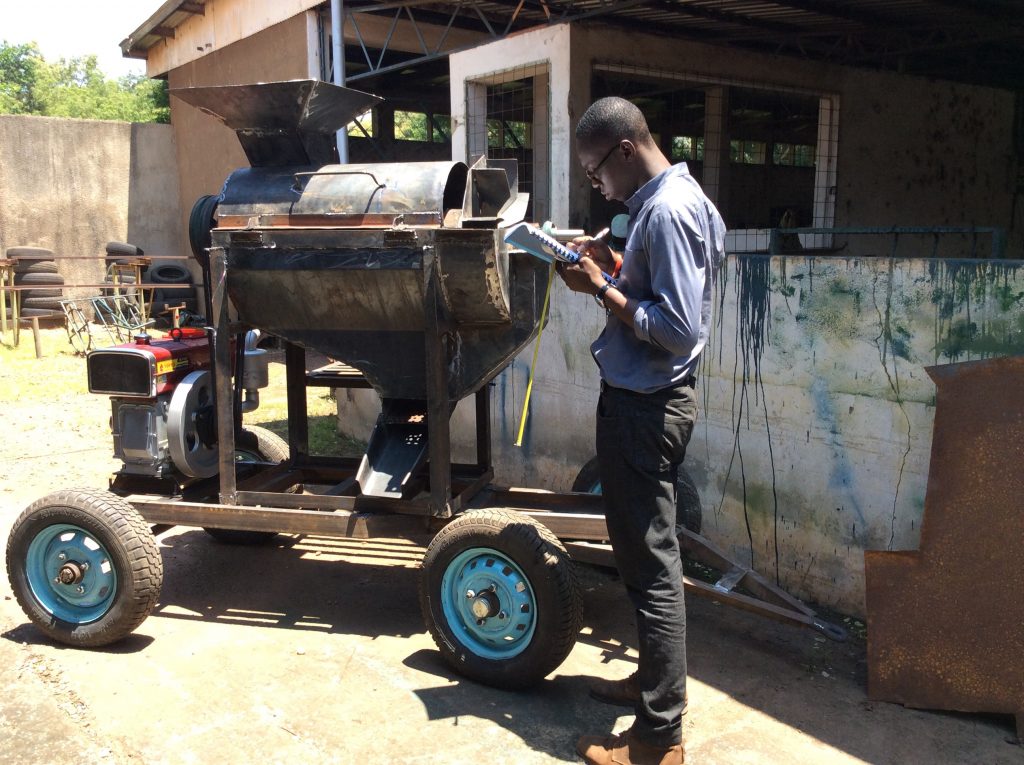Young Entrepreneur Brings Solution to Empower Manufacturers
Young Entrepreneur Brings Solution to Empower Manufacturers
Read how Jeffrey Appiagyei is changing the face of agricultural machinery for artisans across Africa.
Since winning an innovation contest back in 2014, Jeffrey Appiagyei has made it his goal to change agricultural mechanization education and training for manufacturers across Africa. He wants to make it possible for local entrepreneurs to manufacture agricultural equipment that will make it easier for farmers to modernize their production, reduce post-harvest loss and ultimately improve food security across his country and continent.
“I want to change things at the national level,” Appiagyei said. “I want young people to see the potential of the huge African market and the vast space available for locally produced, high-quality agricultural equipment. To accomplish sweeping change in the technological ability of a community or country to support its entire agricultural value chain, local innovation and machinery fabrication is essential.”
In partnership with the Feed the Future Innovation Lab for Soybean Value Chain Research, the 22-year-old CEO of Sustainable African Youth Enterprise and Technologies (SAYeTECH) is working to create and provide training programs for young engineers, equipment fabricators and vocational schools in Ghana.
 Photo by Feed the Future Innovation Lab for Soybean Value Chain Research
Photo by Feed the Future Innovation Lab for Soybean Value Chain ResearchWhen the Feed the Future Soybean Innovation Lab began working in Ghana in 2014, it saw a pressing need for the use of mechanized crop threshers to relieve the huge burden on women and youth to manually thresh crops with sticks to dislodge grain. This is an arduous task that is physically difficult and time consuming.
The Innovation Lab held a contest between three U.S. and three Ghanaian universities for students to develop a thresher that local blacksmiths could make at a manageable price for smallholder farmers in Ghana. Appiagyei, a 2017 graduate of Kwame Nkrumah University of Science and Technology in Kumasi, Ghana, was one of the winners of the contest and turned that success into a career and a mission.
 Photo by Feed the Future Innovation Lab for Soybean Value Chain Research
Photo by Feed the Future Innovation Lab for Soybean Value Chain ResearchSince 2018, SAYeTECH and the Feed the Future Soybean Innovation Lab have hosted crop thresher fabrication training programs in Ghana, Malawi, Uganda, Tanzania and Burundi, with additional training soon to be held in Rwanda, Ethiopia and Kenya. Each machine produced by program participants has the potential to serve 200 farmers and to reduce what used to take two weeks of manual threshing per acre of crop to only four hours of labor with these mechanized multi-crop threshers.
The manufacturers with whom SAYeTECH and the Feed the Future Soybean Innovation Lab work don’t often have opportunities to engage in formal education or training, so these programs are an important way to bring new ideas and techniques to practitioners in the field. SAYeTECH and the Feed the Future Soybean Innovation Lab partner with a local host institution to provide the thresher manufacturing trainings to young adults. While the average age of trainees is 25, the youngest participant was 19-year-old Algoa Eunice, a female blacksmith in Lira, Uganda, who had previously received three months of training in basic welding, and now works at a local blacksmith shop.
“The only thing we learned to make in school were doors and windows,” Eunice said. “There is a lot of competition in those products because that is what everyone learns to make. The thresher is something new that will set me apart from other [manufacturers].”
In addition to training young adults like Eunice, Appiagyei dreams of sparking governments to overhaul their vocational education systems so that students can graduate with the ability to develop and manufacture useful products that will advance agriculture-led growth.
Through the drive of young people like Appiagyei helping other young people gain skills and technological understanding, African agriculture can move toward the increased level of mechanization needed to support greater productivity and global food security.
The Feed the Future Soybean Innovation Lab, led by the University of Illinois, is Feed the Future’s only comprehensive program dedicated to soybean research for development. It is building a foundation for soybean production in Africa by developing the knowledge, innovation, and technologies to enable successful soybean production. The Soybean Innovation Lab works to reduce global poverty and hunger by accelerating growth in the agriculture sector through improvements in agricultural productivity among smallholder farmers.
